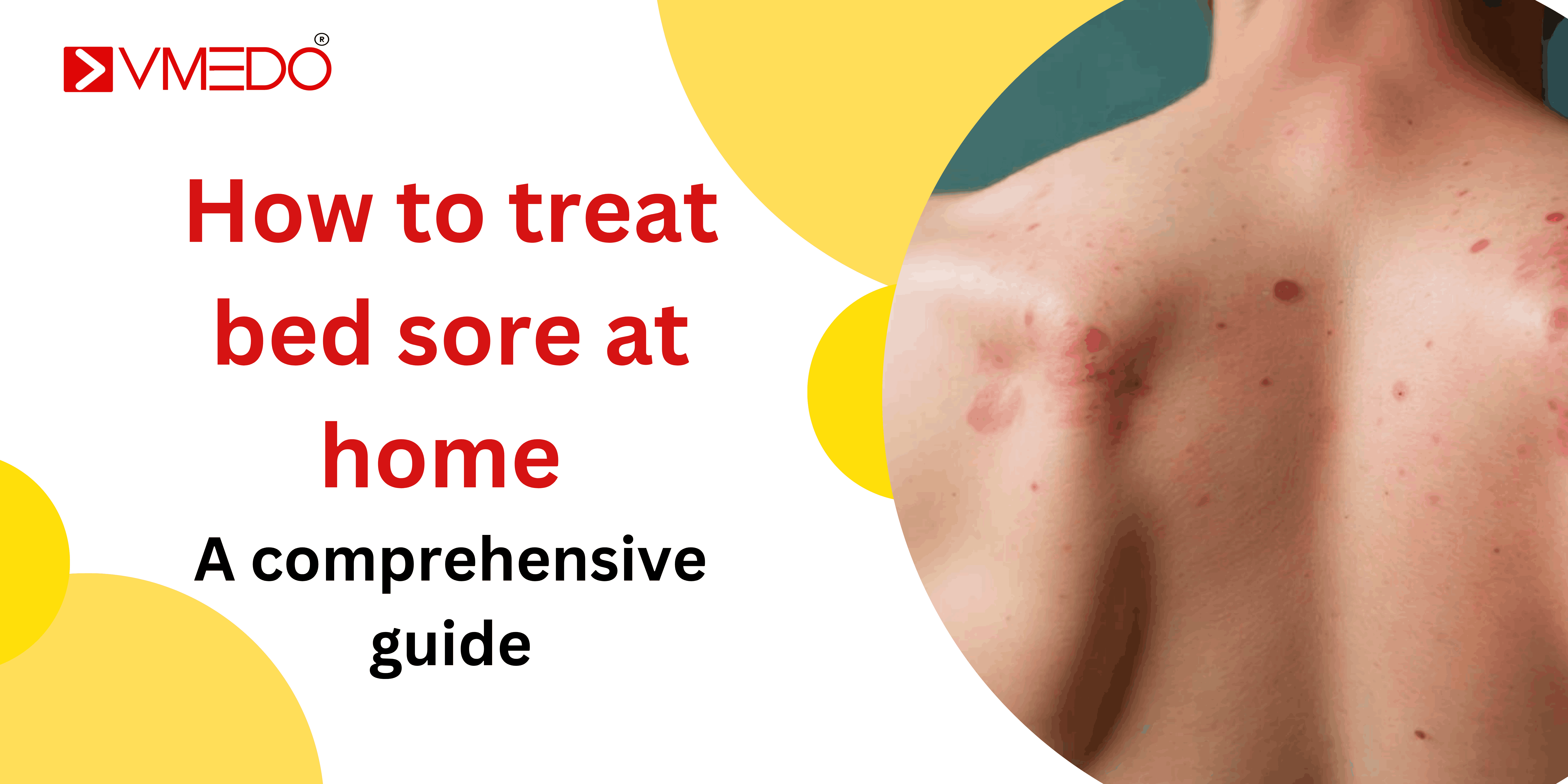Bed sores, also known as pressure ulcers or decubitus ulcers, are injuries to the skin and underlying tissues caused by prolonged pressure on the skin. They are common among individuals with limited mobility, such as those who are bedridden or in wheelchairs. If left untreated, bed sores can lead to serious infections and complications. However, with proper care and preventive measures, bed sores can be treated effectively at home. This comprehensive guide will walk you through the essential steps to treat bed sores at home and how VMEDO can assist with professional home care in Bangalore.
Understanding Bed Sores
What Causes Bed Sores?
Bed sores occur when sustained pressure cuts off circulation to vulnerable areas of the body, especially over bony areas such as the heels, hips, elbows, and tailbone. Without enough blood flow, the affected skin tissue begins to break down, leading to sores. Contributing factors include:
- Prolonged Immobility: Being confined to a bed or wheelchair for long periods.
- Friction: Rubbing the skin against clothing or bedding, which weakens it.
- Shear: When the skin stays in place but the underlying tissues shift, causing skin damage.
- Moisture: Excessive moisture from sweat or incontinence can soften the skin and make it more prone to sores.
Stages of Bed Sores
Bed sores are classified into four stages based on their severity:
- Stage 1: Redness and pain without broken skin.
- Stage 2: The skin breaks open, forming a blister or shallow wound.
- Stage 3: The sore extends into deeper layers of the skin, forming a crater.
- Stage 4: The damage reaches muscle, bone, or tendons, often resulting in serious infection.
Step-by-Step Guide to Treat Bed Sores at Home
1. Relieve Pressure on Affected Areas
The first step in treating bed sores is to relieve pressure from the affected area. If the person is bedridden, they should be repositioned every two hours to redistribute weight and reduce pressure on vulnerable areas. If using a wheelchair, reposition every 15 to 30 minutes.
How to Relieve Pressure:
- Use pillows or foam wedges: Place these under the hips, heels, or elbows to reduce pressure.
- Invest in a pressure-relieving mattress or cushion: Air or gel-based cushions can help distribute weight evenly.
- Reposition regularly: This is crucial to ensure no area of the body is under pressure for too long.
2. Clean the Wound Properly
If the bed sore has progressed to an open wound (stage 2 or beyond), it’s essential to clean it to prevent infection. Here’s how to do it:
- Use saline solution: Clean the wound with a saline solution (saltwater) to remove dead tissue and bacteria. Avoid using hydrogen peroxide or iodine, as they can damage healthy tissue.
- Gently dry the area: Use a soft, clean cloth to pat the area dry—never rub the wound.
- Apply an appropriate dressing: A moist wound environment is critical for healing, so use a wound dressing that keeps the area moist but not wet. Hydrocolloid, foam, or alginate dressings can be effective.
3. Apply Topical Treatments
Depending on the stage and severity of the bed sore, a healthcare professional may recommend specific topical treatments:
- Antibiotic ointments: These can help prevent or treat infections in minor sores.
- Barrier creams: These can protect the skin from moisture, particularly for individuals with incontinence.
- Hydrocolloid or foam dressings: These dressings maintain moisture while protecting the wound from further damage.
4. Improve Nutrition and Hydration
Proper nutrition is a vital part of healing bed sores. Encourage the patient to consume a balanced diet rich in:
- Protein: To repair and regenerate tissues.
- Vitamins A and C: For skin health and wound healing.
- Zinc: Helps with skin repair.
- Hydration: Keeping the patient hydrated improves skin elasticity and helps wounds heal faster.
If necessary, a healthcare professional can provide advice on dietary supplements to support healing.
5. Use Specialized Equipment
Investing in equipment designed to reduce pressure and friction can accelerate healing and prevent further sores from developing. Some useful products include:
- Air or alternating-pressure mattresses: These mattresses reduce the risk of sores by redistributing pressure.
- Gel or foam wheelchair cushions: Designed to provide better support and minimize pressure points.
- Heel protectors: These can help reduce friction and protect the heels, which are common pressure points.
Preventing Bed Sores at Home
1. Frequent Position Changes
The most effective way to prevent bed sores is through frequent position changes. Caregivers should help bedridden patients reposition every 1-2 hours, while wheelchair users should shift their weight every 15-30 minutes.
2. Maintain Good Skin Hygiene
Keeping the skin clean and dry is crucial to preventing sores. Regular bathing with mild soap and lukewarm water, followed by gentle drying, can help. Moisturize dry areas to maintain skin integrity, but avoid applying creams to open sores unless recommended by a healthcare provider.
3. Manage Incontinence
For individuals with incontinence, it’s essential to manage moisture to prevent skin breakdown. Use absorbent pads and barrier creams to protect the skin from excessive moisture.
4. Regular Skin Inspections
Caregivers should perform daily skin checks to look for early signs of redness, swelling, or skin breakdown, especially around bony areas. Early detection can prevent small issues from becoming serious.
5. Encourage Movement and Activity
For patients who are able, regular movement and activity can help improve circulation and reduce the risk of bed sores. Simple exercises or range-of-motion activities can be beneficial.
When to Call a Doctor
While many bed sores can be managed at home, there are times when professional medical attention is necessary. You should consult a healthcare provider if:
- The sore is worsening or not healing.
- There are signs of infection, such as pus, increased redness, swelling, or a foul odor.
- The patient has a fever, which could indicate a more serious infection.
- Pain in the affected area becomes severe or unmanageable.
VMEDO can provide in-home nursing care and wound management, helping to monitor progress and provide medical interventions if needed.
How VMEDO Can Help with Bed Sore Treatment at Home
VMEDO is a leading healthcare provider in Bangalore, offering comprehensive home health care services to treat and prevent bed sores. Here’s how VMEDO can assist:
- In-Home Nursing Care: Our experienced nurses provide expert wound care, administer dressings, and ensure proper hygiene to promote healing and prevent further sores.
- Nutritional Guidance: Our healthcare professionals can provide personalized dietary plans to support faster recovery and improve overall skin health.
- Telehealth Consultations: We offer telehealth services to provide ongoing monitoring, advice, and medical guidance from the comfort of your home.
- Caregiver Training: VMEDO offers training for family caregivers to ensure they are equipped with the knowledge and skills needed to manage bed sores effectively at home.



